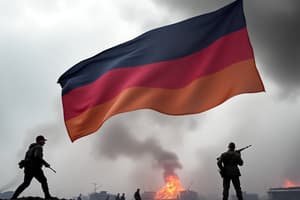Podcast
Questions and Answers
What was the primary goal of the Big 4 during the London Conference in November 1947?
What was the primary goal of the Big 4 during the London Conference in November 1947?
- To establish a united German government under Soviet control
- To promote Western European integration (correct)
- To split Germany into East and West immediately
- To provide reparations to Germany
What event occurred as a direct result of the failure of the London Conference in 1947?
What event occurred as a direct result of the failure of the London Conference in 1947?
- Creation of a unified German government
- Formation of the Berlin Wall
- Separation of West Germany from East Germany
- Strengthening the concept of a West German State (correct)
Which currency was introduced in West Germany on June 20, 1948?
Which currency was introduced in West Germany on June 20, 1948?
- Ostmark
- German Mark (correct)
- Euro
- Reichsmark
What tactic did the Soviets use to respond to the establishment of a West German state?
What tactic did the Soviets use to respond to the establishment of a West German state?
What was the purpose of the airlift conducted by the Western allies in response to the Berlin Blockade?
What was the purpose of the airlift conducted by the Western allies in response to the Berlin Blockade?
During the Moscow Talks on August 2, what was Stalin’s response to the proposals made by the Western allies?
During the Moscow Talks on August 2, what was Stalin’s response to the proposals made by the Western allies?
Which countries were involved in the second London Conference in June 1948?
Which countries were involved in the second London Conference in June 1948?
What was the stance of Britain regarding the revival of Germany during the discussions of the second London Conference?
What was the stance of Britain regarding the revival of Germany during the discussions of the second London Conference?
What was a key reason for the Western Allies' rejection of the UN proposal for the Ostmark?
What was a key reason for the Western Allies' rejection of the UN proposal for the Ostmark?
Which event signaled the end of the Berlin Blockade?
Which event signaled the end of the Berlin Blockade?
What was the significant outcome in March 1949 regarding currency in West Germany?
What was the significant outcome in March 1949 regarding currency in West Germany?
What characterized the political system of the German Democratic Republic (GDR)?
What characterized the political system of the German Democratic Republic (GDR)?
What was the main purpose of the Brussels Pact signed in 1948?
What was the main purpose of the Brussels Pact signed in 1948?
What was a primary concern for Western nations regarding the rearmament of the Federal Republic of Germany (FRG)?
What was a primary concern for Western nations regarding the rearmament of the Federal Republic of Germany (FRG)?
What was the outcome of the Foreign Ministers' meeting in May 1949?
What was the outcome of the Foreign Ministers' meeting in May 1949?
What fear did Stalin possess regarding the establishment of a separate East German state?
What fear did Stalin possess regarding the establishment of a separate East German state?
Which event led to the US’s strong push for a formal alliance through NATO?
Which event led to the US’s strong push for a formal alliance through NATO?
What was a major reason for the limited integration of Western Europe during the late 1940s?
What was a major reason for the limited integration of Western Europe during the late 1940s?
Flashcards
London Conference (1947)
London Conference (1947)
A meeting of the Big Four (US, UK, USSR, France) to find a solution for post-war Germany but failed.
Creation of West German State
Creation of West German State
Following the failure of the London Conference, Western Allies established West Germany, a new independent nation.
Deutschmark (German Mark)
Deutschmark (German Mark)
The currency introduced in West Germany to stabilize its economy during the post-war period
Berlin Blockade
Berlin Blockade
Signup and view all the flashcards
Berlin Airlift
Berlin Airlift
Signup and view all the flashcards
Moscow Talks (1948)
Moscow Talks (1948)
Signup and view all the flashcards
Soviet Response to West German State
Soviet Response to West German State
Signup and view all the flashcards
International Ruhr Authority
International Ruhr Authority
Signup and view all the flashcards
Berlin Blockade End
Berlin Blockade End
Signup and view all the flashcards
FRG (Federal Republic of Germany)
FRG (Federal Republic of Germany)
Signup and view all the flashcards
GDR (German Democratic Republic)
GDR (German Democratic Republic)
Signup and view all the flashcards
NATO Formation
NATO Formation
Signup and view all the flashcards
Article 99 UN Charter
Article 99 UN Charter
Signup and view all the flashcards
Occupation Statute
Occupation Statute
Signup and view all the flashcards
Berlin Divided
Berlin Divided
Signup and view all the flashcards
Brussels Pact
Brussels Pact
Signup and view all the flashcards
Rearmament of FRG
Rearmament of FRG
Signup and view all the flashcards
Korean War Impact
Korean War Impact
Signup and view all the flashcards
Study Notes
Division of Germany – London Conference (Nov. 1947)
- The Big Four met in London to address Germany's division
- US promoted Western European unity
- USSR aimed for a unified Germany, believing that a divided Germany would be weak
- Soviet Union tried to gain public support through Walter Ulbricht (SED)
- Ulbricht organised a "German People’s Congress for Unity and Just Peace"
- A third of Western Germany's population were communists, but they did not accurately reflect the public's views
- Britain rejected Soviet efforts to include communist parties in the conference
- The London Conference concluded with accusations that Britain and the US violated the Potsdam Agreement by restricting reparations
- Western powers rejected the Soviet proposal of a united government
The Decision to Create a West German State
- Failure of London Conference solidified the idea of a separate West German state
- A second London Conference (June 1948) involved Britain, France, USA, Belgium, Netherlands, and Luxembourg
- France did not support a revived Germany, and the US responded by stationing troops in Western Europe
- Britain and the US planned to closely control the West German government
- International Ruhr Authority and Occupation Statute to control trade and foreign relations and West Germany's economy
- Western Germany was authorized to form a democratic constitution (June 7, 1948)
Currency Reform
- Introduction of the Deutschmark (German Mark) as West Germany's currency (June 20, 1948)
- Soviet Zone introduced the Ostmark (East Mark)
The Soviet Response – The Berlin Blockade
- Soviets aimed to force Western allies to abandon plans for West Germany
- Blockade of rail and road links to West Berlin (March 1948), citing the devaluation of the German Mark in relation to the Reichsmark
- All land routes to West Berlin were blocked
Western Response
- Initial confusion about how to handle the blockade
- Airlift of supplies to West Berlin (July 1948) – approximately 2,000 tons/day of supplies. Increased to 5,000 tons during the winter.
- US deployed long-range bombers in Britain to deter the USSR
The Moscow Talks
- Three Western Allies met with the USSR on Aug. 2, 1948 to discuss access routes
- Stalin's rejection of Western proposals
Failure of the UN
- UN Secretary-General Trygve Lie proposed applying Article 99 (maintenance of international peace) to the Berlin Crisis
- UN proposed an end to the blockade and a discussion among military governors
- Soviet Union proposed using the Ostmark in all of Berlin, immediately
- Western Allies rejected, fearing Soviet control
- UN financial committee proposed the Ostmark as Berlin's sole currency but was rejected by the Western powers
End of the Blockade
- Stalin's realization of the impending failure of his plan
- Removal of the blockade (May 12, 1949) due to a lack of progress from a meeting between foreign ministers
The Emergence of the 2 German States
- Western Allies created the Federal Republic of Germany (FRG)
- Eastern Zone created the German Democratic Republic (GDR)
- Berlin remained divided under four-power control
Federal Republic of Germany (FRG)
- Constitution approved in spring 1949, with elections for the Bundestag (parliament) in August
- Konrad Adenaur became the first FRG Chancellor
- Occupation Statute replaced military government zones with a High Commission
German Democratic Republic (GDR)
- Soviets were reluctant to create a separate East German state
- GDR Constitution was drafted by the SED and approved by the People's Council (March 1949)
- Single-party state with pre-approved candidate lists
- Soviets ultimately established the GDR in October 1949
Berlin
- Divided after the separation of East and West Germany
- West Berliners not citizens of the GDR
- GDR's capital was East Berlin
- Berlin Wall built in 1961
Western/Eastern Relations
- Fear of West German revival influenced policy decisions, both in the East and West.
- Concerns over potential invasion, leading to defensive alliances
The Brussels Pact
- Defensive alliance signed by Belgium, Britain, France, Luxemburg, and the Netherlands
- Treaty aimed to protect members against aggression
- Precursor to NATO
The North Atlantic Treaty Organization (NATO)
- Prague Coup and Berlin Blockade prompted US development of NATO (1948-49)
- US wanted to include West Germany in the alliance
- NATO signed on April 4, 1949, and operationalized afterward
The Rearmament of the FRG
- The formation of NATO and the FRG concerned the Soviet Union
- USSR tested its atomic bomb (Aug 1949)
- Soviet expansion of armed forces and military supplies followed
- CCP and USSR Alliance
- Limited Western European Integration as West feared the possible economic dominance of West Germany
Impact of the Korean War
- The Korean War intensified Western fears that Stalin might encourage further aggression
- Reinforced concerns and increased Western defensiveness due to East German support (paramilitary police force of 60,000 soldiers)
Studying That Suits You
Use AI to generate personalized quizzes and flashcards to suit your learning preferences.




